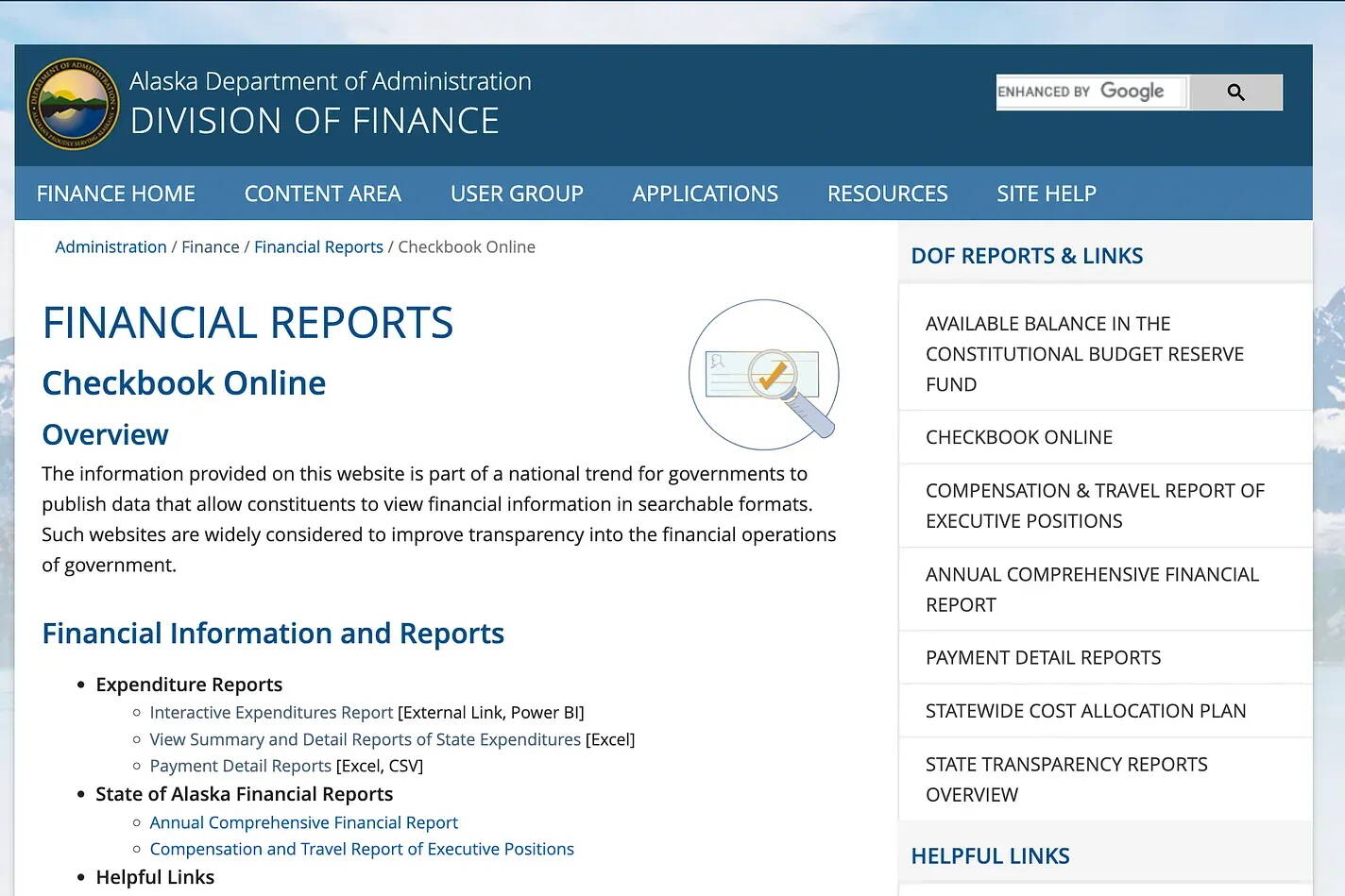Republican Gov. Mike Dunleavy’s administration has missed a legal deadline to expand Alaska’s public spending database to some of its most heavily scrutinized state corporations, prompting a written complaint from the state senator who pushed the overhaul.
In unanimous votes by the state House and Senate, lawmakers last year approved expansion of the “Checkbook Online” system to include state entities like the Alaska Industrial Development and Export Authority, the Alaska Gasline Development Corp. and the Alaska Energy Authority.
The legislation set a deadline of Oct. 1, 2023 — a full year after it became law. Anchorage Democratic Sen. Bill Wielechowski, who sponsored the bill, described the timing as a concession to the state Division of Finance, which administers the system.
Another concession was a one-time, $250,000 capital budget item to pay for the cost of the upgrades.
More than two months after the deadline, the system looks almost unchanged from before the legislation passed. At the end of October, the finance division posted an update saying it had posted a new interactive spending report — but that report appears to include none of the newly required spending details from the state authorities and corporations.
The legislation, Wielechowski wrote Monday in a letter to the division, aimed “to improve Alaska’s financial transparency by making information about state income, expenditures, fund balances, Permanent Fund royalty deposits, and contractors available in a web-based format that is readily searchable.”
But, he wrote, “the new website your division created appears to only have the same expenditure data that was available to download from the previous ‘Alaska Checkbook Online’ website.”
Wielechowski asked the division to comply with his bill “as soon as possible.”
“I don’t know what they did with the money,” Wielechowski said in an interview. “It looks like what they did was, they simply took spreadsheets and plopped them online — which is not what we expected or anticipated, or what we think the legislation required.”
The finance division’s director, Hans Zigmund, did not respond to a request for comment about the system. An official from the Department of Administration, the division’s parent agency, said Zigmund was in his last week of state service before starting a new job, while a top deputy was out on paternity leave.
In January, Zigmund said in an email to Northern Journal that progress on the new system “has been slower than we’d like, but the goal is still to be online by October.”
Policymakers, journalists and members of the public have long turned to the preexisting checkbook system to examine spending and identify procurement contracts signed by executive branch departments, the Legislature and the governor’s office.
It launched in 2008 under Republican Gov. Sarah Palin, who ran for office on an anti-corruption platform, and whose administration said the system was designed “to provide more information and transparency to Alaskans.”
But the existing system omitted some of the state’s most closely watched agencies, like the Alaska Industrial Development and Export Authority, or AIDEA. AIDEA is leading controversial projects across the state: Oil leasing in the Arctic National Wildlife Refuge, a proposed road to the Ambler Mining District in Northwest Alaska that passes through a national park and another road across the Susitna River north of Anchorage that would also access mineral deposits.
“I think the public is very concerned about how our public corporations are spending their money, and they want to make sure they’re getting the best bang for their buck for their investments,” Wielechowski said. “A lot of these corporations ask for sole-sourcing in procurement, and I think it’s important that you have watchdogs keeping an eye on how that money’s being spent.”
Wielechowski’s bill, which was introduced in 2021, drew not just bipartisan endorsement in the Legislature, but also support from advocacy groups across the political spectrum. The left-leaning Alaska Public Interest Research Group backed it, as well as the conservative organization Americans for Prosperity.
In addition to the one-time, $250,000 capital item to launch the system, Wielechowski’s legislation also added $65,000 to pay for ongoing expenses for servers and software.
Beyond expanding the system to include corporations and authorities, the legislation also called for the publication of monthly, unaudited state revenue from different tax types, license sales and federal receipts.
And it called for the system to publish the estimated monthly balances of three key state savings accounts: the statutory and constitutional budget reserves, and the Alaska Permanent Fund’s earnings reserve.
None of that information is currently available from the finance division’s website. A short, undated note on the site says that it will be expanded to include information to comply with Wielechowski’s legislation “as additional data extracts and reports are developed.”
• Nathaniel Herz welcomes tips at natherz@gmail.com or (907) 793-0312. This article was originally published in Northern Journal, a newsletter from Herz. Alaska Beacon, an affiliate of States Newsroom, is an independent, nonpartisan news organization focused on connecting Alaskans to their state government.

